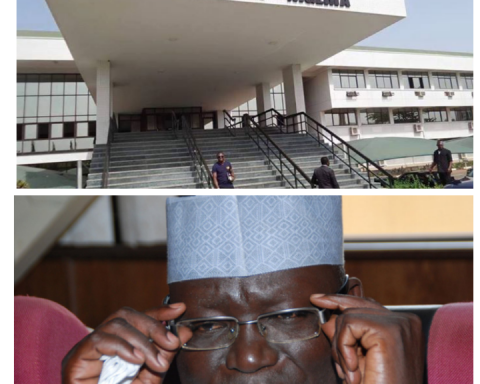President, Pension Fund Operators Association of Nigeria, Oguche Agudah, has called on the Federal Government and police hierarchy to review the salary structure and welfare of police officers as a way of resolving lingering issues of poor pension and gratuity.
Prime Business Africa reports that retired police officers on Monday staged nationwide protests against what they described as poor pension and gratuity.
Join our WhatsApp ChannelThe demonstration was reportedly sparked by a viral video of a retired officer lamenting the payment of just N3 million after 35 years of service, reigniting national attention on the plight of former police personnel.
The police retirees, who staged protests at Force Headquarters in Abuja and National Assembly entrance gates, are demanding their removal from the Contributory Pension Scheme (CPS), saying they receive ridiculous amounts as pensions after 35 years of service.
Speaking in an interview on Channels Television’s breakfast programme, Morning Brief on Tuesday, Agudah said what the retired police officers are getting under the Contributory Pension Scheme is determined by their monthly salaries while in active service.
“Your pension under the Contributory Pension Scheme is a function of your salary,” Agudah stated.
He pointed out that the poor pensions paid to retired officers have to do with the issue of welfare in the Nigerian Police Force generally.
He observed that officers who encounter stagnation in terms of promotion would over time record low contribution and poor payout during retirement.
READ ALSO:
Police And Contributory Pension Scheme
Back To A Failed Past As Nigeria Police Nears Pension Scheme Exit
He said one of the ways to tackle the problem of poor payout is for the Federal Government or the police hierarchy to review the process and increase the contribution for the police force from the current 10 per cent to about 20 per cent.
According to him, under the current arrangement of the CPS, employees contribute about 8 per cent while the employer contributes 10 per cent of the monthly salary.
On concerns raised by those who advocate going back to Defined Benefit Scheme (DBS), Agudah said it might seem like a good move at the onset, but it is not fiscally sustainable.
He stated that any year the government is short of revenue, there may not be a budget for the scheme, leading to pensioners not being paid.
Highlighting the benefits of CPS, he said in the case of sudden disengagement before reaching retirement, an employee under the scheme would have access to his or her Retirement Saving Account (RSA), while the fate of those under DBS would be determined by the police pension board in such a situation. According to him, the board is usually not transparent
“Under the CPS, there are many safeguards. What we are saying now is how do we increase the contribution,” he stated.
“It doesn’t matter whether you move CPS or DBS; pension is a function of your salary.
“We need to look at the issue of pay across police structure and welfare generally,” he added.
He said successive governments have not paid the pension under the DBS because they didn’t have the money for it.
“So, if we are going to move the whole pension liability to the government, when the government couldn’t even pay some portion of that, it is going to cause financial armageddon in terms of sustainability.
“The Police Pension Bill is not fiscally sustainable. It is not implementable.”
He also urged the police authority to identify ways of utilising the internally generated revenue to augment the pension and gratuity package for retired officers.
Victor Ezeja is a passionate journalist with seven years of experience writing on economy, politics and energy. He holds a Master's degree in Mass Communication.













